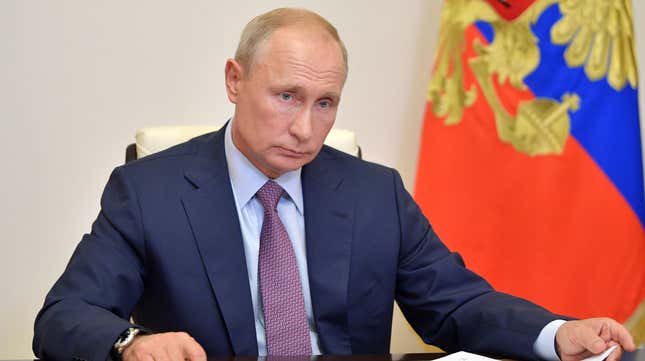
Vladimir Putin has laid claim to the first covid-19 vaccine, developed by the Gamaleya Research Institute of Epidemiology and Microbiology in Moscow. On Tuesday, he announced on state television that Russia had approved the vaccine, saying that “I know that it works quite effectively, it forms a stable immunity.” This so far comes with little evidence, but does any miracle?
As news outlets have widely noted, the lack of transparency—including, according to the Washington Post, basic peer reviewing—raises concerns over whether creators have sidestepped safety protocols in order to rush the vaccine to the masses. (And presumably beat out the West; the vaccine is not-so-subtly named “Sputnik V.”) The New York Times reports that it has not undergone Phase III trials, though Putin reportedly told government officials that “it has passed all the necessary tests.”
Putin has also claimed his own daughter has taken Sputnik V‚ which is how all human trials start.
The Russian Direct Investment Fund (RDIF), a sovereign wealth fund established by the Russian government which funded the research, has put up a strange, some might even say propagandistic website for the vaccine—and by extension for Russia itself—with a splashy op-ed supposedly revealing an anti-Russia conspiracy. “This opinion piece, which tells the story behind the creation of the Russian vaccine against COVID-19 and emphasizes the willingness of Russia to cooperate with the international community, has been rejected by all leading Western media,” reads an introduction. The RDIF intends to “lift the blockade imposed on positive information about the Russian COVID-19 vaccine.”
“The ‘Sputnik moment’ has happened,” RDIF CEO Kirill Dmitriev wrote in the aforementioned op-ed, referring to the alleged breakthrough vaccine before lauding Russia’s other achievements, include a smallpox vaccine administered to Catherine the Great “30 years before the first vaccination was done in the United States.” Dmitriev claims the RDIF has reached “international agreements” to produce 500 million doses annually to start, though he also claims demand for Sputnik V has surpassed 1 billion doses.
In a section titled “Confronting Skepticism,” Dmitriev states that the results of the first two phases of trials will be published this month, “in line with international requirements” and will show that, “all the participants of the clinical trials developed a 100 percent immunity to COVID-19.” Mass production is expected by September, according to Dmitriev, with plans to to conduct clinical trials in three other countries.
The letter does not specify how many people received the vaccine, though according to the Russia-based clinical trials watchdog the Association of Clinical Trials Organizations (ACTO)— which has sent a letter to Health Minister Mikhail Murashko requesting that the Ministry postpone issuing state registration for the vaccine only if and when the developers complete all stages of clinical trials—Gamaleya hasn’t even completed testing on even one hundred people.
Speaking to Bloomberg, ACTO Executive Director Svetlana Zavidova called the vaccine a “Pandora’s Box,” stating that Russian companies are sidestepping rules around clinical trials that are “written in blood.”
According to Dmitriev, the “real secret” to the Gamaleya Institute’s speed was its use of preexisting research on adenoviral vectors, which are essentially other viruses, bioengineered to act as vehicles for a cure. “Since the start of the COVID-19 pandemic all Russian researchers had to do was to extract a coding gene from the spike of the novel coronavirus and implant it into a familiar adenovirus vector for delivery into a human cell,” Dmitriev writes. “They decided to use this already proven and available technology instead of going into uncharted territory.”
Adenovirus vector vaccines are in development in China, the UK, and the U.S., according to Chemical & Engineering News, and the technique has been around for over thirty years, but this method has yet to result in any great success stories. Some proto-vaccines have been ineffective or even increased infections—most disastrously in 2007 HIV trials. Sputnik V is supposedly superior because it uses two adenoviral vectors rather than one, again, according to its lead financier. The Gamaleya Research Institute already produced an Ebola vaccine used on “several thousand people” using this method—although, as of 2019, the World Health Organization stated that there is no clinical data to support the effectiveness of that particular vaccine.
Few have expected vaccines to arrive in a matter of months because even after vaccines surpass the laborious trial-and-error of development, it takes time to observe the long-term effects and determine widespread safety. Dr. Anthony Fauci, Director of the US’s National Institute of Allergy and Infectious Diseases, has said that he doesn’t expect a widely-available vaccine until at least mid-2021. As recently as this weekend, he’s been quoted as stating that the odds of developing a vaccine with a 98% effectiveness rate at all are “not great.”
World Health Organization spokesperson Tarik Jasarevic said at a U.N. briefing on Tuesday that WHO is in “close contact with Russian health authorities” in regards to moving ahead with Sputnik V, but that any kind of rubber stamp is predicated on data transparency. “Prequalification of any vaccine,” Jasarevic noted, “includes the rigorous review and assessment of all required safety and efficacy data.”
Gizmodo has reached out to the Gamaleya Institute, the Russian government, and the Russian Direct Investment Fund, and will update the post if we hear back.